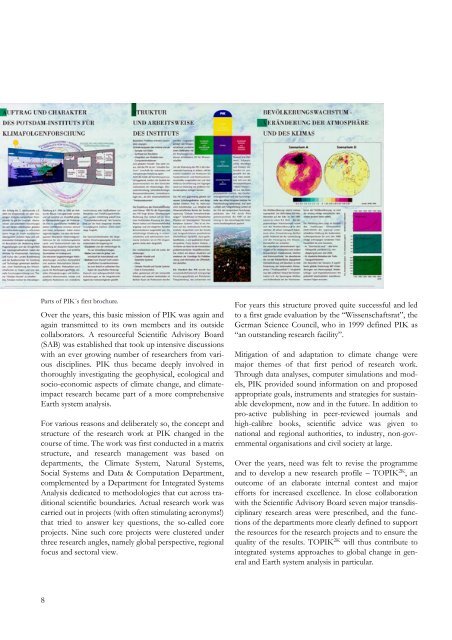PIK Biennial Report 2000-2001 - Potsdam Institute for Climate ...
PIK Biennial Report 2000-2001 - Potsdam Institute for Climate ...
PIK Biennial Report 2000-2001 - Potsdam Institute for Climate ...
You also want an ePaper? Increase the reach of your titles
YUMPU automatically turns print PDFs into web optimized ePapers that Google loves.
Parts of <strong>PIK</strong>´s first brochure.<br />
Over the years, this basic mission of <strong>PIK</strong> was again and<br />
again transmitted to its own members and its outside<br />
collaborators. A resourceful Scientific Advisory Board<br />
(SAB) was established that took up intensive discussions<br />
with an ever growing number of researchers from various<br />
disciplines. <strong>PIK</strong> thus became deeply involved in<br />
thoroughly investigating the geophysical, ecological and<br />
socio-economic aspects of climate change, and climateimpact<br />
research became part of a more comprehensive<br />
Earth system analysis.<br />
For various reasons and deliberately so, the concept and<br />
structure of the research work at <strong>PIK</strong> changed in the<br />
course of time. The work was first conducted in a matrix<br />
structure, and research management was based on<br />
departments, the <strong>Climate</strong> System, Natural Systems,<br />
Social Systems and Data & Computation Department,<br />
complemented by a Department <strong>for</strong> Integrated Systems<br />
Analysis dedicated to methodologies that cut across traditional<br />
scientific boundaries. Actual research work was<br />
carried out in projects (with often stimulating acronyms!)<br />
that tried to answer key questions, the so-called core<br />
projects. Nine such core projects were clustered under<br />
three research angles, namely global perspective, regional<br />
focus and sectoral view.<br />
8<br />
For years this structure proved quite successful and led<br />
to a first grade evaluation by the “Wissenschaftsrat”, the<br />
German Science Council, who in 1999 defined <strong>PIK</strong> as<br />
“an outstanding research facility”.<br />
Mitigation of and adaptation to climate change were<br />
major themes of that first period of research work.<br />
Through data analyses, computer simulations and models,<br />
<strong>PIK</strong> provided sound in<strong>for</strong>mation on and proposed<br />
appropriate goals, instruments and strategies <strong>for</strong> sustainable<br />
development, now and in the future. In addition to<br />
pro-active publishing in peer-reviewed journals and<br />
high-calibre books, scientific advice was given to<br />
national and regional authorities, to industry, non-governmental<br />
organisations and civil society at large.<br />
Over the years, need was felt to revise the programme<br />
and to develop a new research profile – TO<strong>PIK</strong> 2K , an<br />
outcome of an elaborate internal contest and major<br />
ef<strong>for</strong>ts <strong>for</strong> increased excellence. In close collaboration<br />
with the Scientific Advisory Board seven major transdisciplinary<br />
research areas were prescribed, and the functions<br />
of the departments more clearly defined to support<br />
the resources <strong>for</strong> the research projects and to ensure the<br />
quality of the results. TO<strong>PIK</strong> 2K will thus contribute to<br />
integrated systems approaches to global change in general<br />
and Earth system analysis in particular.

















